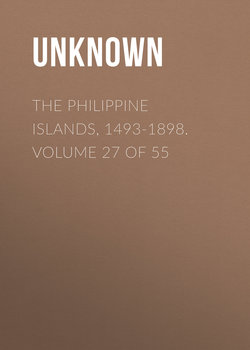Читать книгу The Philippine Islands, 1493-1898. Volume 27 of 55 - Unknown - Страница 9
На сайте Литреса книга снята с продажи.
Grau y Monfalcon’s Informatory Memorial of 1637
Number 2. Condition of the commerce of the islands, and dangers from any changes therein
ОглавлениеTo begin with the fact that furnished a reason for so purposely discussing these matters: it is presupposed that the commerce of the Filipinas to Nueva España was carried on with some degree of prosperity, although with all the restriction that could be endured—albeit the royal orders were in certain cases less closely observed than seemed desirable, and it was an obligation to attend only to what demanded correction, and to what was sufficient to adjust the commerce, and reduce it to its best method. But another method was proposed which would have completely checked or suppressed it, by advising measures that would so alter the former one that, even if there were any irregularities in the old method which are avoided in this, that is accomplished by impeding and ruining the commerce; so that it will become necessary, in order not to permit one slight loss, to cause many, so irreparable that either the ruin of the islands will follow from them, or the total expense of their conservation will fall back on your Majesty’s royal treasury. And although it is always right (and today more than ever) to take care that since your revenue is not increased, it be not diminished, it is not a successful expedient to represent the saving of expense and the increase of income, if from what is gained on the one side, results on the other, either the loss of what it is advisable to defend, or the addition of heavier expenses for its defense. For there are matters which have attained so even and regular an equilibrium and balance, that, from whichever of its parts one subtracts or adds, the other side inclining is unsettled, and the structure that they compose is destroyed. One can easily understand that if your Majesty were to dispense with the payment of avería5 on the royal treasure that comes from the Indias in the war and trading fleets of their line, there would be a clear gain annually of more than half a million, in both silver and gold; but from that gain would result the failure of means to maintain the principal. And if the freighters, and those who are interested in the rest [of the trade] can with just cause excuse themselves from attending to the avería; and it is necessary that this treasure, as well as that of private persons which is brought with it, be accompanied by an armed force sufficient to resist those who have so great desire to pillage it: the alternative is either that it come without that force, and thus liable to lose more in one year than the expense for its defense in ten, or that all the cost be loaded on to your Majesty’s treasury, by which doing away with the avería would be a greater expense than would paying it. Who can deny that if the customs duties in the ports of España were to go up to fifty or one hundred per cent, they would not be worth ten times more than they are worth at present? But who would say that such an expedient would ensure the duration of commerce, and the ability of your vassals and the foreigners to maintain it? If the immediate result of increasing the duties must be the loss of the principal from which they are collected, the ruin of trade, the desertion of the ports, the impoverishment of your vassals, the depopulation of the cities, and the ruin of everything, one can easily understand that this scheme would, under pretext of increasing the royal treasury, ruin it and destroy the kingdom. These examples are no different from what is observed in the commerce of Filipinas. It is represented that, by the measures which are ordered to be put in force, the duties in the port of Acapulco alone will be increased one million seven hundred thousand pesos; and although this calculation, as will be seen, has no foundation, supposing that it did have, that increase would result in such a decline of trade there that everything would go to ruin. [In the margin: “In numbers 83, 85, and 91.”]6 And if the wealth on which that trade depends should fail, either your Majesty will alone sustain the Filipinas, or you will have to abandon them. The first is almost impossible without spending twice as much as is now spent. The second has the disadvantage that will be explained. [In the margin: “In numbers 6–44.”] Therefore the execution of the methods proposed at once carries with it irreparable injuries, which, after they have happened, will be so difficult of remedy, that the return of things to their present condition may not be possible. As this [present] condition has become established during the course of many years, it is preserved both by the wealth that those who sustain it have acquired during those years, and by merely allowing it to continue. But, if those two requisites fail, first will be experienced the loss of courage in the ruin [that will ensue], as the return [of courage] can be seen in the restoration [of the present condition].
5
Avería was the tax or duty levied on goods shipped from Spain to America, or from America to Spain, to meet the expenses of the naval convoy to protect the fleet from pirates. See tit. ix of lib. ix, Recopilación de leyes de Indias which treats of the avería, entitled, “Of the tax, administration, and collection of the duty of avería.”—Edward G. Bourne.
6
Note in margin of Extracto historial: “Note: The numbers cited in these margins refer to this same memorial.”
